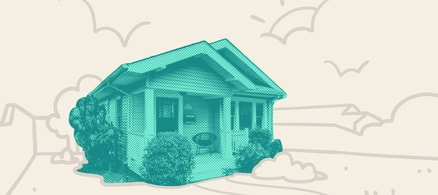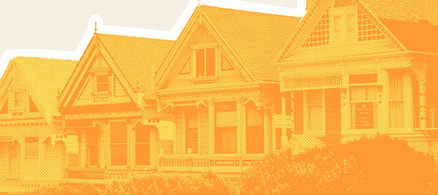First-time homebuyer programs in Pennsylvania
The PHFA offers several different home loan programs, as well as down payment assistance programs and a federal tax credit.
Its home loans feature competitive 30-year fixed rates and low fees. You’ll work with one of the PHFA’s qualified lenders to apply for and secure your loan. Once you’ve closed on your home, the PHFA will serve as your loan servicer. That means you’ll be making your monthly mortgage payments to the PHFA. This program is only open for the purchase of single-family homes.
More: First-time homebuyer tips
HFA Preferred and HFA Preferred Risk Sharing
These two PHFA loan programs allow homebuyers to make down payments of as little as 3%. HFA Preferred loans require borrowers to pay mortgage insurance premiums when making a down payment under 20%; the HFA Preferred Risk Sharing loans don’t have the mortgage insurance requirement but do come with “slightly higher” interest rates.
To qualify for either, you’ll have to fall within the programs’ household income limits. There’s no first-time homebuyer requirement here, but you’ll have to be using the home as your primary residence.
You’ll also need to put down at least $1,000 of your own funds towards the loan as well as attend a homebuyer education program. If you complete an in-person pre-purchase counseling program, you may receive a $300 credit you can use for your closing costs.
Keystone Home Loan Program
This program is for first-time homebuyers, but it’s also open to repeat buyers who live in targeted areas (indicated by a “T” on this form) or are veterans. To qualify, your household’s gross annual income can’t exceed the Keystone Home
The Keystone Home Loan Program’s income limit and the home purchase price must fall under the program’s maximum.
Keystone Government Loan Program
This mortgage loan program provides borrowers with financing on FHA, VA and USDA loans. The PHFA doesn’t impose additional guidelines outside of the corresponding federal agency’s requirements. This program is open to both first-time and repeat homebuyers.
You’ll have to meet the Keystone Home Loan’s income and purchase price limits. You may also qualify for the Mortgage Tax Credit Certificate and the Keystone Advantage Assistance loan.
More: FHA loan vs. conventional loan
Keystone Advantage Assistance Loan Program
The Keystone Advantage Assistance Loan programs provides qualified homebuyers with a second mortgage loan to help cover the costs associated with buying a home. You could receive up to 4% of the purchase price, to a maximum of $6,000.
The loan will have a 10-year term with 0% interest, and you’ll repay it in installments every month. You can use this program in conjunction with PHFA’s mortgage loan programs.
HOMEstead Down Payment and Closing Cost Assistance
This down payment and closing costs assistance program offers second mortgage loans to borrowers who already have their first loan through PHFA. You can qualify for a no-interest loan of up to $10,000, which will be forgiven after five years.
To qualify, you’ll need to meet the minimum down payment requirement for your first loan. You can use the HOMEstead funds to cover the remainder of your down payment and closing costs. If you’re using PHFA’s Keystone Home Loan program and meet the income and purchase price limits, you can use the HOMEstead program, too. Funding is eligible on a first-come, first-served basis.
Stop overpaying for home insurance
Home insurance is an essential expense – one that can often be pricey. You can lower your monthly recurring expenses by finding a more economical alternative for home insurance.
SmartFinancial can help you do just that. SmartFinancial’s online marketplace of vetted home insurance providers allows you to quickly shop around for rates from the country’s top insurance companies, and ensure you’re paying the lowest price possible for your home insurance.
Explore better ratesWho qualifies for first-time homebuyer programs in Pennsylvania?
The Pennsylvania Housing Finance Agency’s state programs are designed to help low- to moderate-income families find affordable housing. Most of its programs are not exclusive to first-time homebuyers, though borrowers will have to meet income and purchase price limits.
Homebuyer education is encouraged for all, and required for applicants who have a credit score lower than 680.
More: Get a free credit score and credit monitoring from Credit Sesame.
Mortgage Credit Certificate
A Mortgage Credit Certificate (MCC) is a direct dollar-for-dollar credit on your federal taxes. You can claim from 20% to 50% of the total mortgage interest you pay in a year, with a maximum credit of $2,000 for the entire life of your loan.
An MCC is open to homebuyers using a PHFA first mortgage through the HFA Preferred, HFA Preferred Risk Sharing or Keystone Government Loan programs. It also can be combined with the Keystone Advantage Assistance loan.
To qualify, you’ll have to be a first-time homebuyer, with the exception of qualified veterans and those who live in a target area.
You can apply for the MCC through your mortgage lender. If you want to get an idea of how much you can claim, the PHFA provides a mortgage credit calculator.
Loans for first-time homebuyers
The most common way to buy a home is to find a “conventional mortgage” through the private market. They often have low interest rates but high requirements, including a credit score of at least 620 and a typical minimum down payment of 5%.
Many first-time buyers will find one of the following nonconventional options, run by the federal government, a better fit.
More: Find a new savings account to build up your down payment.
FHA loans
Back in 1934, most Americans were still renting their homes. To encourage more renters to become homeowners, the Federal Housing Administration created FHA loans.
The requirements for FHA loans are a bit looser than for conventional mortgages. You can get away with a credit score of just 580, and with a big enough down payment you could go as low as 500. The minimum down payment is 3.5%, but you’ll have to pay extra for mortgage insurance if you put down less than 10%.
More: FHA loan requirements
VA loans
Congress passed an act in 1944 to grant more benefits to veterans, including easier access to homeownership. From that act, VA loans were created. Since then, the U.S. Department of Veterans Affairs (VA) has guaranteed or insured home, farm and business loans made to veterans by lending institutions.
Access to these loans is limited to active service members, veterans or surviving military spouses. VA loans have a very low barrier to entry because they don’t require a down payment or mortgage insurance, but they do have a significant funding fee.
More: Mortgage income calculator
USDA loans
For lower-income rural and suburban Americans, USDA loans are a great option. They’re guaranteed by the United States Department of Agriculture and, like VA loans, don’t require a down payment or mortgage insurance.
One trade-off with a USDA loan is that you’ll have to pay an upfront 1% guarantee fee and an annual 0.35% fee of your total loan amount. But compared to the mortgage insurance costs associated with other types of loans, you’re likely to come out ahead.
Bear in mind these loans are specifically for lower-income households. The current income limits in most parts of the U.S. are $86,850 for one- to four-member households and $114,650 for five- to eight-member households, though the thresholds may be higher if you live in a county with a high cost of living. You can find your region’s limits on the USDA’s website.
Need cash? Tap into your home equity
As home prices have increased, the average homeowner is sitting on a record amount of home equity. Savvy homeowners are tapping into their equity to consolidate debt, pay for home improvements, or tackle unexpected expenses. Rocket Mortgage, the nation's largest mortgage lender, offers competitive rates and expert guidance.
Get StartedNext steps
With all the information laid out in front of you, it may not be clear where you should start. You’ll need to get a few things ready before you begin applying to any of these programs.
First, you’ll need to know where your credit stands to ensure you meet any credit score requirements for loans or support. The site Credit Sesame can provide a free look at your score and some basic tips to improve it.
But if you’ve fallen behind on payments in the past and have less-than-impressive credit as a result, you may want to consider a credit-building service like Credit Strong to give your score a boost.
The next step is to gather all of your important documents. That includes the financial documents you’ll need to demonstrate that you have money in the bank and a steady income.
Once that’s done, you can think about getting preapproved for a mortgage so you can finally get out there and start house hunting.
| Arizona | |
| Arkansas | |
| California | |
| Colorado | |
| Connecticut | |
| Delaware | |
| Florida | |
| Georgia | |
| Hawaii | |
| Idaho | |
| Illinois | |
| Indiana | |
| Iowa | |
| Kansas | |
| Kentucky | |
| Louisiana | |
| Massachusetts | |
| Michigan | |
| Minnesota | |
| Missouri | |
| Montana | |
| Nebraska | |
| Nevada | |
| New Mexico | |
| New York | |
| North Carolina | |
| Ohio | |
| Oklahoma | |
| Oregon | |
| Pennsylvania | |
| South Dakota | |
| Tennessee | |
| Texas | |
| Utah | |
| Virginia | |
| Washington | |
| Wisconsin | |
| Wyoming |
Sponsored
Follow These Steps if you Want to Retire Early
Secure your financial future with a tailored plan to maximize investments, navigate taxes, and retire comfortably.
Zoe Financial is an online platform that can match you with a network of vetted fiduciary advisors who are evaluated based on their credentials, education, experience, and pricing. The best part? - there is no fee to find an advisor.








